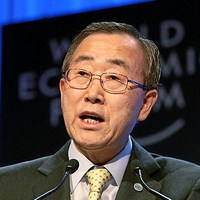Does Ban Ki-moon fall prey to the sin of envy when he thinks of Pope Francis? The two men are arguably the leaders of the two most significant global institutions, and idealists have dubbed the secretary-general of the United Nations a “secular pope.” Ban does not subscribe to this grandiloquent self-description. But he may wish he could communicate moral themes as effectively as the new pontiff.
Francis impressed even nonbelievers last month with a deeply felt attack on the rising “economy of exclusion and inequality.” Ban, who hopes to forge a new international deal to end extreme poverty by 2030, may well echo those concerns. But he has been fighting two other moral battles in recent months, trying to focus international attention on the crisis in the Central African Republic (CAR) while also continuing to lobby for peace, justice and humanitarian help for the benighted people of Syria. His words on CAR have had some effect. Yet he may have to retreat from some of his firmest denunciations of the Syrian regime as Western powers accept the need for a compromise peace deal with Damascus.
Ban, accused in the past of lacking a clear ethical purpose, now often resorts to strong language. In August, when the Security Council still seemed wary of authorizing serious action in CAR, he warned of a “total breakdown of law and order” in the country. In November, with France finally preparing to intervene alongside African troops, the secretary-general tried to win over doubters by predicting a “spiral into an uncontrollable situation, including atrocity crimes” in the absence of a stabilization effort.

